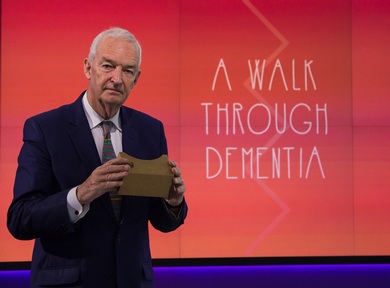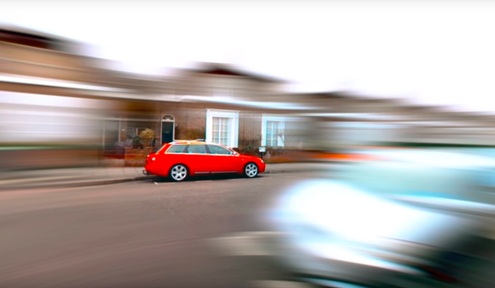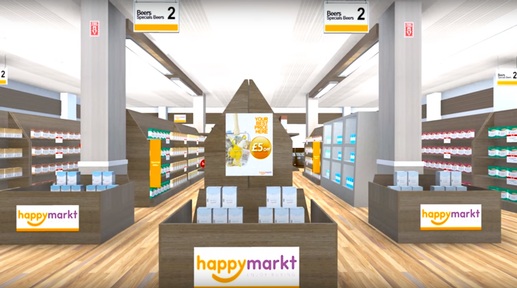Virtual reality app provides unique insight into life with dementia
An innovative new smartphone app is offering people an insight into what it is like to live with dementia. The ‘A Walk Through Dementia’ app created by Alzheimer’s Research UK and VISYON provides users with an immersive insight into the condition.
The app was launched over a three-day public installation at London’s St Pancras International Station between 2-4 June following its development with Alzheimer’s Research UK and virtually reality specialists VISYON. The Android-exclusive app uses the Google Cardboard headset to put users in the shoes of some of the 850,000 people living with dementia across the UK.
Providing a clear picture of the challenges faced when living with dementia
Chief executive of Alzheimer’s Research UK, Hilary Evans, said: “Dementia is commonly misunderstood, so A Walk Through Dementia is designed to offer the public a clearer picture of the challenges that people living with the condition face in everyday life. The app also gives a poignant insight into the emotional impact of symptoms, an element that people with dementia told us was important to achieve. Although each person with dementia experiences the condition differently, and it would be hard to recreate the full range of complex symptoms, harnessing new technology like virtual reality helps us engage people with the impact of dementia on a new level.”

The app is the first smartphone Google Cardboard app that has been used to engage members of the public with the condition.
Voiced by Olivier award-winning actress, Dame Harriet Walter, who lost both her parents to dementia, and including an introduction from Channel 4 broadcaster Jon Snow whose mother died of Alzheimer’s disease, A Walk Through Dementia has been designed to help users think beyond memory loss – traditionally associated with dementia. The app allows them to have a fully immersive insight into the symptoms experienced by people with dementia in their everyday life.
Dame Harriet Walter said: “I have had personal experience of dementia with both my parents but acting this character was the first time I had had to get inside the head of someone with the condition. It was daunting. I realised that I am not too young to develop this disease that we mostly think about as an old-age problem. I also realised that what seems incoherent on the outside comes from a human being trying to make sense.
“The character I play is at a tricky stage where she knows she is losing some of her faculties, and that must be terrifying. But the story also deals with the carers and people around her and talks of her family. Everyone is affected by this disease and each person's story is unique.
“I hope this little slice of life we have created will help people to understand some of the lesser-known symptoms, and increase their awareness of the emotional impact that living with those symptoms can cause. More people are likely to develop dementia in the coming years, so any attempt to add to our understanding of the nature of the condition can only be welcome.”
Channel 4 broadcaster, Jon Snow commented: “Having lost my mother to Alzheimer’s, and witnessed her struggle with the symptoms of dementia, it’s clear that the effects are far more complex and far-reaching than memory loss alone.
"A Walk Through Dementia gives an insight into how simple tasks we take for granted can become daily trials for people with the condition – there’s something about the everyday nature of the story the project tells that make it all the more affecting. Technology like VR can really transport someone to a different place, time or even give them a sense of what it’s like to live as someone else. I hope A Walk Through Dementia will help create some empathy for people living with the condition.”
Challenging everyday tasks
The app uses a combination of computer generated environments and 360 degree video to illustrate how even the most everyday tasks, such as making a cup of tea, can become a challenge for someone living with dementia.

Featuring three scenarios, users get to experience buying ingredients in a supermarket, taking them home and making a cup of tea for their family. The supermarket environment reveals difficulties experienced by someone with dementia both in the shop and at the checkout, from reading the shopping and counting money, to dealing with a busy supermarket environment and finding the items they need.
The second scenario contains a street sequence, which illustrates the problems that someone living with dementia may face when trying to navigate their way home, demonstrating visual-spatial problems and disorientation.
The third and final scenario plays out when back home. Making the tea for visiting family member’s presents its own challenges, including struggling to memorise instructions and coordination problems.
A Walk Through Dementia was developed with the support of people living with dementia and Professor Sebastian Crutch at UCL’s Dementia Research Centre.
Dementia is a unique experience
Trina Armstrong has Posterior Cortical Atrophy (PCA) and helped advise on the apps development. PCA is a rare form of Alzheimer’s disease that affects the back of the brain, the part responsible for visual function and spatial awareness. People living with disease often experience problems moving, tackling stairs and extensive problems with the vision.

She said: “Anyone living with dementia will experience it uniquely, but I hope A Walk Through Dementia will provide people with an idea of what the world is like for me. Everyday things like popping to the supermarket or making a cup of tea are things I used to take for granted, but dementia presents a real barrier to my everyday life in ways that people often don’t realise. It’s been empowering for me to feed some of my symptoms and experiences into the app and see them re-created. I hope it will encourage the public to think differently about dementia and the people living with the condition they might meet.”
While app developer, VISYON described 'the power of technology to inform, connect and really change attitudes’. Chief executive, Pere Perez added: “We were pleased to develop A Walk Through Dementia, which showcases how emerging technologies such as virtual reality can help charities communicate in new and engaging ways. Immersive content formats encourages us to re-think how we tell stories and allows us to place users at the centre of the experience, rather than just watching from the sidelines. With a condition as misunderstood as dementia, the power of this technology to inform and connect with people could really change attitudes.”
To fully appreciate the 360 degree element of the app, clips are best viewed on a smartphone allowing users to physically move with each scenario. A Walk Through Dementia is available from the Google Play Store (http://bit.ly/1spg4Ol) for use on Android phones. For more information on the app visit: www.awalkthroughdementia.org, where non-Android users can watch scenario clips.
Latest Features News
 25-Nov-19
2019 Election: Boris Johnson leaves social care in 'too difficult box' but Labour vows to end 'crisis'
25-Nov-19
2019 Election: Boris Johnson leaves social care in 'too difficult box' but Labour vows to end 'crisis'
 18-Oct-19
Podcast: Wendy Mitchell and dementia: 'My biggest fear is not knowing who my daughters are'
18-Oct-19
Podcast: Wendy Mitchell and dementia: 'My biggest fear is not knowing who my daughters are'
 27-Sep-19
Exclusive: Care minister backs care workers' call for time off to grieve and attend funerals
27-Sep-19
Exclusive: Care minister backs care workers' call for time off to grieve and attend funerals
 19-Sep-19
Podcast: Gyles Brandreth says poetry helps ward off dementia
19-Sep-19
Podcast: Gyles Brandreth says poetry helps ward off dementia
 30-Aug-19
Edinburgh Fringe funnyman joins comics facing toughest audience at care home gig
30-Aug-19
Edinburgh Fringe funnyman joins comics facing toughest audience at care home gig